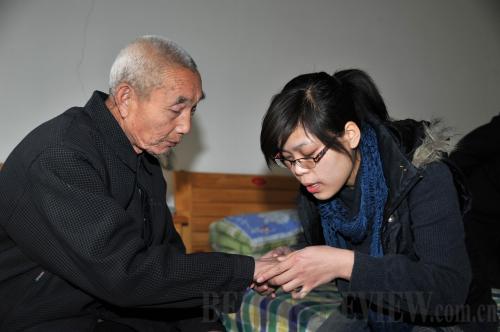|
 |
|
CARING FOR THE ELDERLY: Social worker Xu Yamei nurses an old man at the Jinan Social Welfare Home in Shandong Province on March 16 (XU SUHUI) |
Yang Tuan, Deputy Director of the Social Policy Research Center under the Chinese Academy of Social Sciences, said that the country urgently needs community-based social workers.
"Community-based social workers can effectively settle various social conflicts," Yang said. She suggested that social workers should be given some level of power in social administration by the government.
"Currently, most social workers on the Chinese mainland have not received professional training," said Huang Shengwei, Director of the Social Work Division of the Ministry of Civil Affairs.
Incomplete statistics from the ministry show that there are only about 200,000 social workers on the Chinese mainland, which has a population of 1.3 billion. Meanwhile, only about a quarter of these social workers have passed the exams they must take to become licensed social workers.
At present, most social workers are employed in Beijing, Shanghai and several big cities, while China's vast rural expanses, especially those in the country's central and western regions, are home to hardly anyone in that line of work.
"Every year, more than 250 higher educational institutions in China graduate about 10,000 students who major in social service. In 2006, nearly 60 percent of them chose to work in other occupations, although fewer and fewer are making the same decision every year," Huang said, citing surveys conducted by the Ministry of Education.
Many graduates said that they decided to pursue different careers seeing social workers' low income and the lack of opportunities for promotion.
Li Luling, 25, has been a social worker for three years. After graduating, Li's first job in the field wasn't quite as rosy as she had expected.
"Three of my colleagues left in the first two months. We all felt lost, and felt our work didn't have value. I left three months later," said Li, who is now a social worker at a nongovernmental organization based in Beijing's Xicheng District. Her daily responsibilities include assisting a home for senior citizens in the district.
Li said the meager salary of her previous job prompted her to quit, but her current position is also not well paid. Three years ago, her monthly salary was 1,300 yuan ($190.34) and now it is 2,600 yuan ($380.67).
Apart from struggling to live a decent personal life with such a low income, Li also finds it hard to put what she learned into practice.
"We studied social service in college. But there are many branches, such as nursing the elderly and providing psychological services for teenagers, that we are not familiar with," she said.
According to a research by Li Zhiying, a professor at the School of History of Beijing Normal University, about one 10th of newly recruited social workers quit within six months after they entered service. More than 85 percent left within a year. Only 4 out of 70 graduates recruited as social workers continued in their jobs for a year.
"The main reason for the poor retention rate is that there is no regular mechanism for payment increases. You never know when the next payment increase is going to happen," Li said, adding that money is not the only factor.
In 2009, Shanghai offered an annual salary of 100,000 yuan ($14,641) for a social service vacancy. Hundreds of people applied for the position but even the "lucky" person who got the job left after two months due allegedly to poor career prospects.
"Educated people value their social status. It matters whether they will be respected in society," Li said. "Social workers, especially those receiving higher education, want to know how far they can advance."
According to Li Luling, there are few opportunities for social workers to receive promotions. "You may spend your whole life being a social worker without making much progress in your career," she said.
The Central Government has acknowledged the difficulties social workers are facing.
The joint statement released by central government agencies outlines measures to increase vocational training programs available for social workers.
Also, as part of the government plan, 2 million qualified social workers will be employed by the end of 2015 and 3 million by 2020.
"It is an enormous task to train 1.8 million social workers by 2015," Xu said. "Our universities will only be able to train 10,000 social service graduates by 2015."
In Shanghai, the number of licensed social workers as of the end of last year stood at 1,554, far below the city's goal of 72,000 by 2015. Beijing alone will also need to train 20,000 new social workers over the next five years.
In Guangdong, the government plans to recruit five social workers for every 10,000 people by 2015, or 50,000 professional social workers for the province's 100 million permanent residents. However, it currently has only 3,000 trained social workers, 2,100 of whom work in Guangzhou, the provincial capital.
Xu believes that specialized institutions are vital for training competent social workers.
The Social Work Faculty at the East China University of Science and Technology is cooperating with various hospitals and local schools in order to train their staff to serve as part-time social workers. Xu personally trained more than 100 medical staff from six local hospitals last year.
"It is a good start. Hospitals and schools have recognized the importance of employing social workers," he said.
Meanwhile, the Beijing City University, a non-public university, has also been authorized by the Ministry of Education to accept post-graduate students for training in social service since November.
Another important step the joint government statement has made is having social service added to the government's budget. Local government departments can now purchase the services of charitable and non-profit organizations that specialize in social service.
"With social service now included in the government budget, public institutions will be able to afford to hire social workers," Xu said. | 